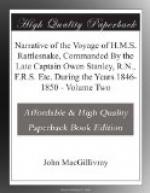4. Hands—marrow-la in the Molonglo dialect; as contrasted with marra in the Adelaide.
This, however, is merely a conjecture, a conjecture, however, which has a practical bearing. It suggests caution in the comparison of vocabularies; since, by mistaking an inflexion or an affix for a part of the root, we may overlook really existing similarities.
Father Anjello’s very brief grammatical sketch of the Limbakarajia language of Port Essington* exhibits, as far as it goes, precisely the same principles as Mr. Macgillivray’s Kowrarega; indeed, some of the details coincide.
(Footnote. Given to Mr. Macgillivray by Mr. James Macarthur, and prefixed to the manuscript Port Essington Vocabulary, alluded to in Volume 1.)
Thus, the Limbakarajia personal pronouns are:
I = nga-pi.
We = ngari.
Thou = noie.
We two = arguri.
He, she, it = gianat.
Ye = noie.
They = ngalmo.
Here the pi in nga-pi is the po in the Aiawong nga-ppo; the gian in gian-at being, probably, the in in the Kowrarega ina = that, this. Ngalmo, also, is expressly stated to mean many as well as they, a fact which confirms the view taken of tana.
As for the tenses of the verbs, they are evidently no true tenses at all, but merely combinations of the verbal root, and an adverb of time. In Limbakarajia, however, the adverbial element precedes the verbal one. In Kowrarega, however, the equivalent to this adverbial element (probably a simple adverb modified in form so as to amalgamate with its verb, and take the appearance of an inflexion) follows it—a difference of order, sequence, or position, upon which some philologists will, perhaps, lay considerable stress. On the contrary, however, languages exceedingly similar in other respects, may differ in the order of the parts of a term; e.g. the German dialects, throughout, place the article before the noun, and keep it separate: whereas the Scandinavian tongues not only make it follow, but incorporate it with the substantive with which it agrees. Hence, a term which, if modelled on the German fashion, should be hin sol, becomes, in Scandinavian, solen = the sun. And this is but one instance out of many. Finally, I may add that the prefix apa, in the present tense of the verb = cut, is, perhaps, the same affix eipa in the present tense of the Kowrarega verbs.
Another point connected with the comparative philology of Australia is the peculiarity of its phonetic system. The sounds of f and s are frequently wanting. Hence, the presence of either of them in one dialect has been considered as evidence of a wide ethnological difference. Upon this point—in the case of s—the remarks on the sound systems of the Kowrarega and Gudang are important. The statement is, the s of the one dialect becomes ty or tsh (and ch) in the other. Thus the English word breast = susu, Kowrarega; tyu-tyu, Gudang, and the English outrigger float = sarima, Kowrarega; charima, Gudang, which of these two forms is the older? Probably the Gudang, or the form in ty. If so, the series of changes is remarkable, and by attending to it we may see how sounds previously non-existent may become evolved.




